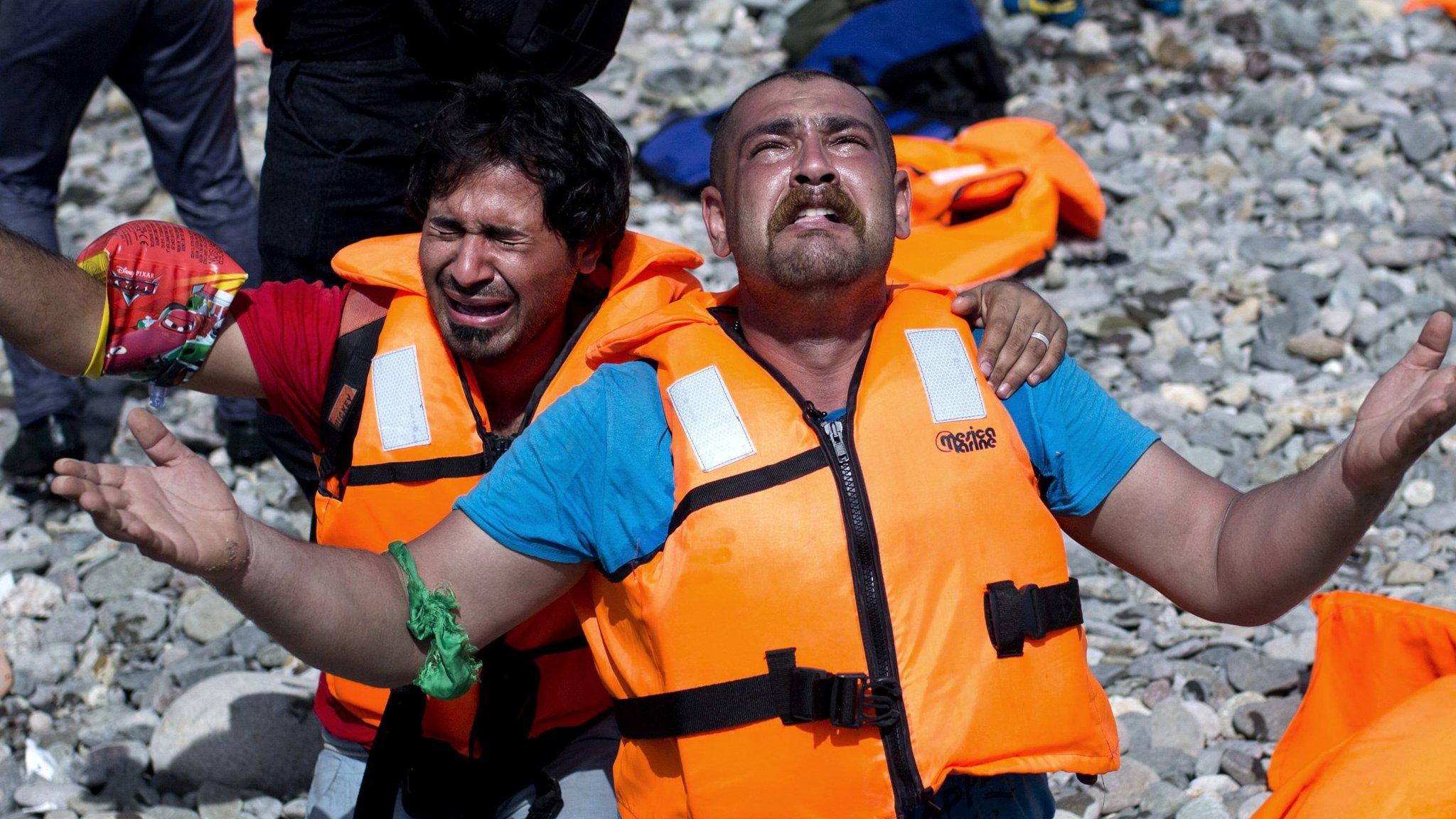Migrant crisis: UK's Syria refugee plan 'not enough', says Labour
- Published
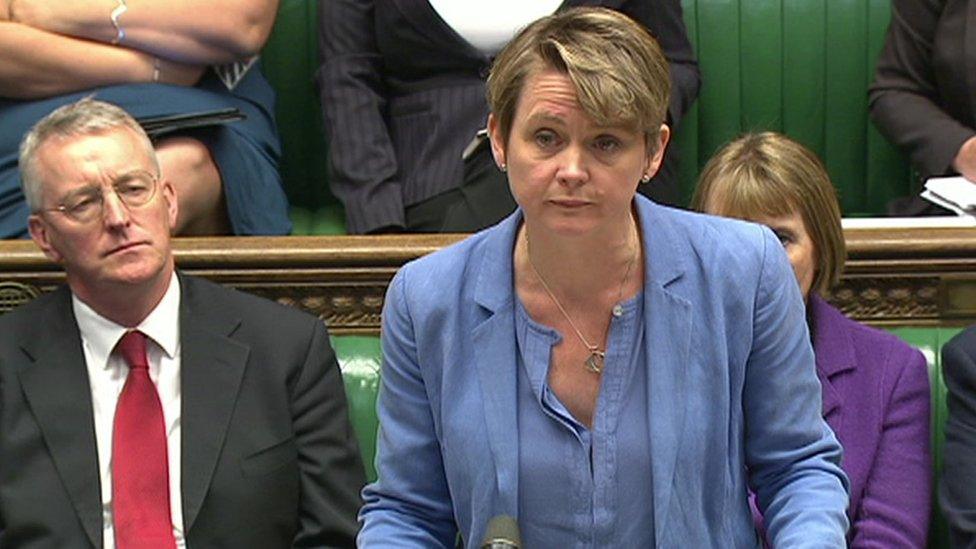
Ms Cooper suggested up to 10,000 refugees could be re-settled in the UK within the next 12 months
Labour has criticised government plans to re-settle 20,000 Syrian refugees in Britain by 2020, saying 4,000 a year is "not enough".
Shadow home secretary Yvette Cooper called for more urgency and said the UK should also take in some of those who have already reached Europe.
Home Secretary Theresa May said the government was doing "everything it can" to help refugees most in need.
MPs were holding an emergency debate on the UK response to the migrant crisis.
David Cameron announced on Monday that the UK will accept up to 20,000 refugees from camps surrounding Syria.
The prime minister said the UK had a "moral responsibility" to those displaced by the conflict in Syria.
But he said taking people from camps in Syria, Turkey and Jordan would provide a "direct and safe" route to safety, instead of encouraging them to make the "hazardous" journey across the Mediterranean by boat.
The new arrivals will be offered five-year humanitarian visas, under the Vulnerable Persons Relocation Scheme, external, and their resettlement will be paid for in the first year from the overseas aid budget.
Syrian refugees in the UK
20,000
more refugees will be resettled in the UK by 2020
4,980
Syrian asylum seekers have been allowed to stay since 2011
-
25,771 people applied for asylum in the UK in the year to end June 2015
-
2,204 were from Syria
-
87% of Syrian requests for asylum were granted
-
145 Syrian asylum seekers have been removed from the UK since 2011
Opening the Commons debate, Ms Cooper said plans to resettle 20,000 more refugees from the camps in and around Syria, while welcome, did not go far enough.
She said ministers needed to be more clear about how many Syrians could settle in the UK now.
"The crisis is now and helping 4,000 refugees this year isn't enough," she told the House of Commons.
David Cameron: "It is right we should do much more"
Ms Cooper added: "If they can help a full 10,000 in the first year, then why not say so? And if they can, then why set a cap for the whole parliament when we have no idea what the circumstances will be in a few years time. In fact, why set a cap for the parliament at all?
"And I'm afraid that this 20,000 over a parliament figure does have the feel of coming up with a plan to maximise the headline number but to to minimise the impact year on year. And it's the wrong approach. We need to know how many the government will help this year."
The government has refused to take part in a proposed EU-wide quota system to resettle those people already in Europe, instead pointing to the UK's contribution of £1bn in humanitarian aid to Syria.
But Ms Cooper argued: "I don't agree we should turn our backs. I don't agree we should say that the crisis in Europe is nothing to do with us and the only people that we will help will be from the Syrian camps themselves."
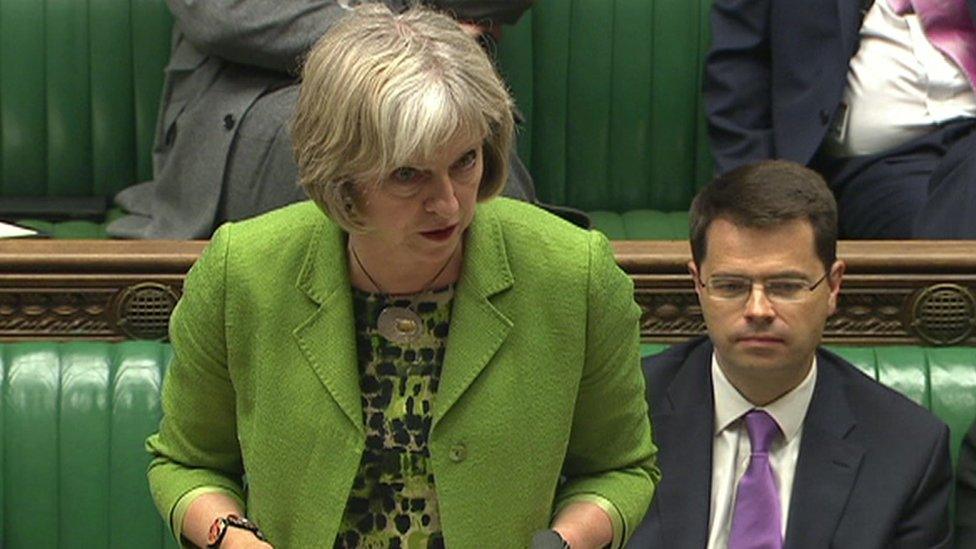
The home secretary told MPs 220,000 people have been killed during the Syrian conflict, and 11 million forced to flee their homes
She urged the government to collaborate with UK councils, charities and faith groups to assess what level of support could be offered to refugees and to then help them to deliver it. A target for how many people to take in one year could then be set, and assessed on an annual basis, she argued.
Responding for the government, Home Secretary Theresa May told MPs "no-one chooses to be a refugee", and that families were being "driven out" of Syria by the civil war.
"It is a brutal conflict, one which does not shudder from the use of torture or sexual violence and which has seen the first use of chemical weapons this century," she added.
'False and offensive'
Mrs May declined to put a figure on how many refugees would be relocated to Britain this year, saying the priority was to work with the UNCHR and UK local authorities to identify the most vulnerable refugees and to ensure appropriate support was available to them when they arrived in the UK.
Addressing Ms Cooper, she said: "I cannot put a figure on for the number in the first year.
"If she thinks about the need to ensure that UNCHR are able to identify the most vulnerable people, the need to ensure that the accommodation and support provided to those people here in the UK will be appropriate for their needs, then it would not be right simply to be chasing some sort of figure in the first year."
Former Lib Dem coalition minister Alistair Carmichael added his voice to criticism of the government's approach.
He said it was "false" and "offensive" to distinguish between refugees in the camps and those travelling to Europe, and added: "Surely our contribution to helping people in need should be based on the need, and not a decision that they might have made in desperation."
MPs are to debate the matter again on Wednesday in an SNP debate that will be followed by a vote.
Meanwhile, the Petitions Committee has decided not to grant time to debate a petition calling for the UK to accept more refugees, external - which has more than 425,000 signatories. It said Parliament will have considered the subject "extensively" this week.
'Frontloaded'
An estimated 340,000 asylum seekers have arrived in Europe so far this year, most braving dangerous sea journeys from North Africa and Turkey.
France said on Monday it would take in 24,000 refugees over the next two years, while about 18,000 people arrived in Germany last weekend alone.
But Hungary, the Czech Republic, Slovakia and Romania have all joined the UK in rejecting the idea of official resettlement quotas.
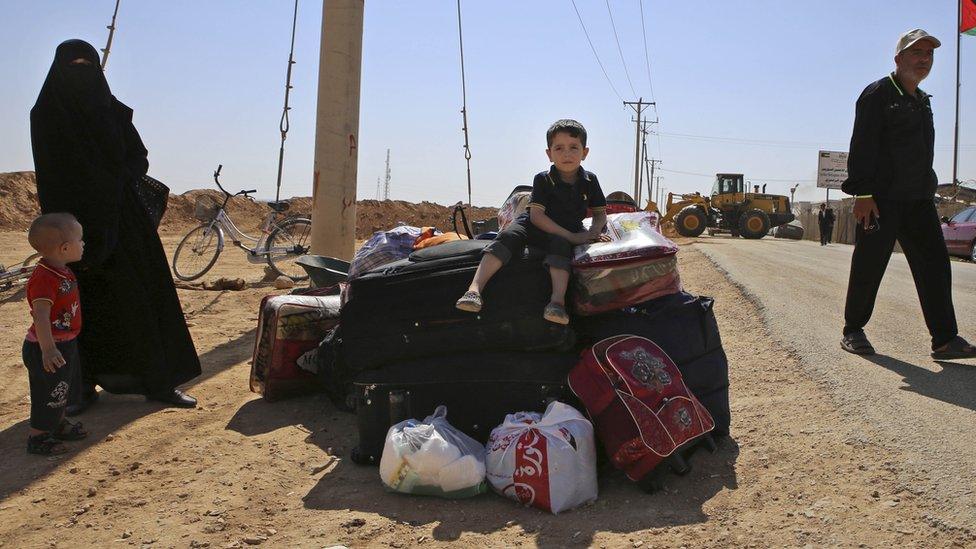
Tens of thousands of displaced Syrians are living in the Zaatari refugee camp in Jordan
Maurice Wren, Refugee Council chief executive, said the government's programme must be "frontloaded" as people "cannot wait until 2020 to reach safety".
Save the Children said the UK announcement would "make a real difference", but it must also take some of the thousands of unaccompanied Syrian children who have already travelled to Europe.
- Published20 August 2015
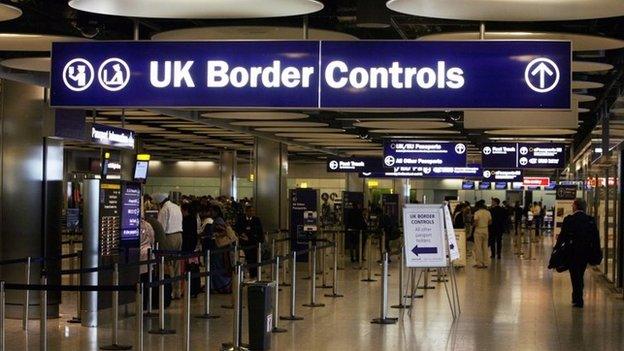
- Published28 January 2016
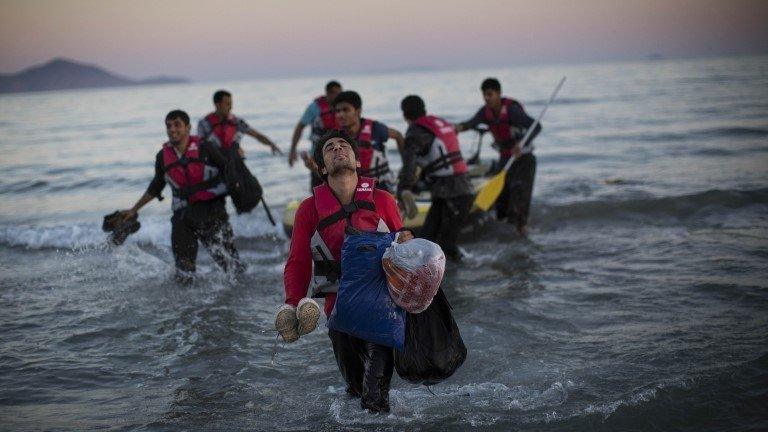
- Published7 September 2015
- Published7 September 2015
